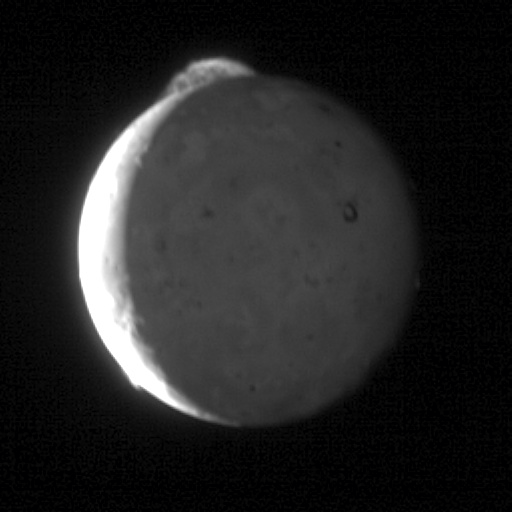- Theoretical planetology
thumb|right|Sequence_of_New Horizons " images showing Io's volcanoTvashtar spewing material 330 km above its surface. The discovery ofvolcanism on Io in 1979 by the Voyager 1 spacecraft confirmed the previous prediction made by theoretical planetology and is considered one of the major successes of theoretical planetology.] of an extremely large simulation of a Raleigh-Taylor instability caused by two mixing fluids. [ [https://wci.llnl.gov/codes/visit/gallery.html Visualizations that have been created with VisIt] . at wci.llnl.gov. Updated: November 8, 2007] Theoretical planetology usescomputer graphics , scientific visualisation, andfluid dynamics extensively.]Theoretical planetology, also known as theoretical planetary science [http://pr.caltech.edu/media/Press_Releases/PR12525.html] is a branch of
planetary sciences that developed in the20th century .http://arxiv.org/abs/astro-ph/0005117]Nature of the work
Theoretical planetologists, also known as theoretical planetary scientists, use
modelling techniques to develop an understanding of the internal structure ofplanet s by making assumptions about theirchemical composition and the state of theirmaterial s, then calculationg the radial distribution of various properties such astemperature ,pressure , ordensity of material across the planet's internals.Theoretical planetologists also use
numerical models to understand how thesolar system planets where formed and develop in the future, theirthermal evolution, theirtectonics , howmagnetic field s are formed in planetary interiors, howconvection processes work in the cores andmantle s ofterrestrial planet s and in the interiors ofgas giants , how theirlithosphere s deform, theorbit al dynamics of planetary satellites, howdust andice is transported on the surface of some planets (such asMars ), and how theatmospheric circulation takes place over a planet.http://www.ess.ucla.edu/research/planet_physics.asp]Theoretical planetologists may use
laboratory experiment s to understand various phenomena analogous to planetary processes, such as convection in rotating fluids.Theoretical planetologists make extensive use of basic
physics , particularlyfluid dynamics andcondensed matter physics , and much of their work involves interpretation ofdata returned byspace missions , although they rarely get actively involved in them.http://www.planetary.caltech.edu/faculty/stevenson/]Educational requirements
Typically a theoretical planetologist will have to have had
higher education inphysics andtheoretical physics , atPhD doctorate level. [http://www.planetary.caltech.edu/faculty/stevenson/cv.html] [http://mr.caltech.edu/media/Press_Releases/PR12525.html]Scientific visualisation
Because of the use of
scientific visualisation animation, theoretical planetology has a relationship withcomputer graphics . Example movies exhibiting this relation are the 4-minute "The Origin of the Moon"http://www.olats.org/space/13avril/2002/space13Avr2002.html]Major successes
One of the major successes of theoretical planetology is the prediction and subsequent confirmation of
volcanism on Io .Encyclopedia of Space Science and Technology by Hans Mark (book), page 883, accessed through Google Books Search: http://books.google.com/books?id=xo9UAAAAMAAJ&q=%22one+of+the+major+success+stories+in+theoretical+planetary+science%22&dq=%22one+of+the+major+success+stories+in+theoretical+planetary+science%22&lr=&pgis=1] http://www.solarviews.com/eng/iovolcano.htm]The prediction was made by
Stanton Peale who, one week beforeVoyager 1 encounteredJupiter , published ascientific paper claiming that Io must be volcanically active. When Voyager 1 photographed Io in 1979, his theory was confirmed. Later photographs of Io by theHubble Space Telescope andNew Horizons spacecraft also showed volcanoes on Io's surface.Criticism
D. C. Tozer ofUniversity of Newcastle upon Tyne [http://www.springerlink.com/content/v825593642193766/] , writing in 1974, expressed the opinion that "it could and will be said that theoretical planetary science is a waste of time" until problems related to "sampling and scaling" are resolved, even though these problems cannot be solved by simply collecting further laboratory data. [http://adsabs.harvard.edu/abs/1982AREPS..10..257S (page 169)]Researchers
Researcher s working on theoretical planetology include:
*David J. Stevenson
*Jonathan Lunine (University of Arizona professor of theoretical planetology and physics, andCassini mission scientist specialising onTitan ) [http://www.tucsoncitizen.com/daily/local/26250.php] [http://sse.jpl.nasa.gov/news/display.cfm?News_ID=9999]References
See also
*
Applied planetology
*Hypothetical planetary object
*Astronomy
*Space sciences
*Earth sciences
*Geology External links
* [http://www.macobserver.com/article/2004/01/29.8.shtml TMO Interview - Why Does A Rocket Scientist Use A Mac?] , features theoretical planetologist
David J. Stevenson
Wikimedia Foundation. 2010.

